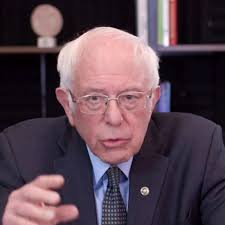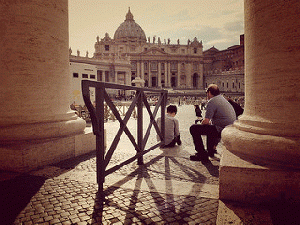Prepared Remarks
The Urgency of a Moral Economy: Reflections on the 25th Anniversary of Centesimus Annus
April 15, 2016
I am honored to be with you today and was pleased to receive your invitation to speak to this conference of The Pontifical Academy of Social Sciences. Today we celebrate the encyclical Centesimus Annus and reflect on its meaning for our world a quarter-century after it was presented by Pope John Paul II. With the fall of Communism, Pope John Paul II gave a clarion call for human freedom in its truest sense: freedom that defends the dignity of every person and that is always oriented towards the common good.
The Church's social teachings, stretching back to the first modern encyclical about the industrial economy, Rerum Novarum in 1891, to Centesimus Annus, to Pope Francis's inspiring encyclical Laudato Si' this past year, have grappled with the challenges of the market economy. There are few places in modern thought that rival the depth and insight of the Church's moral teachings on the market economy.
Over a century ago, Pope Leo XIII highlighted economic issues and challenges in Rerum Novarum that continue to haunt us today, such as what he called "the enormous wealth of a few as opposed to the poverty of the many."
And let us be clear. That situation is worse today. In the year 2016, the top one percent of the people on this planet own more wealth than the bottom 99 percent, while the wealthiest 60 people -- 60 people -- own more than the bottom half -- 3 1/2 billion people. At a time when so few have so much, and so many have so little, we must reject the foundations of this contemporary economy as immoral and unsustainable.
The words of Centesimus Annus likewise resonate with us today. One striking example:
Furthermore, society and the State must ensure wage levels adequate for the maintenance of the worker and his family, including a certain amount for savings. This requires a continuous effort to improve workers' training and capability so that their work will be more skilled and productive, as well as careful controls and adequate legislative measures to block shameful forms of exploitation, especially to the disadvantage of the most vulnerable workers, of immigrants and of those on the margins of society. The role of trade unions in negotiating minimum salaries and working conditions is decisive in this area. (Para15)
The essential wisdom of Centesimus Annus is this: A market economy is beneficial for productivity and economic freedom. But if we let the quest for profits dominate society; if workers become disposable cogs of the financial system; if vast inequalities of power and wealth lead to marginalization of the poor and the powerless; then the common good is squandered and the market economy fails us. Pope John Paul II puts it this way: profit that is the result of "illicit exploitation, speculation, or the breaking of solidarity among working people . . . has not justification, and represents an abuse in the sight of God and man." (Para43).
We are now twenty-five years after the fall of Communist rule in Eastern Europe. Yet we have to acknowledge that Pope John Paul's warnings about the excesses of untrammeled finance were deeply prescient. Twenty-five years after Centesimus Annus, speculation, illicit financial flows, environmental destruction, and the weakening of the rights of workers is far more severe than it was a quarter century ago. Financial excesses, indeed widespread financial criminality on Wall Street, played a direct role in causing the world's worst financial crisis since the Great Depression.
We need a political analysis as well as a moral and anthropological analysis to understand what has happened since 1991. We can say that with unregulated globalization, a world market economy built on speculative finance burst through the legal, political, and moral constraints that had once served to protect the common good. In my country, home of the world's largest financial markets, globalization was used as a pretext to deregulate the banks, ending decades of legal protections for working people and small businesses. Politicians joined hands with the leading bankers to allow the banks to become "too big to fail." The result: eight years ago the American economy and much of the world was plunged into the worst economic decline since the 1930s. Working people lost their jobs, their homes and their savings, while the government bailed out the banks.
Inexplicably, the United States political system doubled down on this reckless financial deregulation, when the U.S. Supreme Court in a series of deeply misguided decisions, unleashed an unprecedented flow of money into American politics. These decisions culminated in the infamous Citizen United case, which opened the financial spigots for huge campaign donations by billionaires and large corporations to turn the U.S. political system to their narrow and greedy advantage. It has established a system in which billionaires can buy elections. Rather than an economy aimed at the common good, we have been left with an economy operated for the top 1 percent, who get richer and richer as the working class, the young and the poor fall further and further behind. And the billionaires and banks have reaped the returns of their campaign investments, in the form of special tax privileges, imbalanced trade agreements that favor investors over workers, and that even give multinational companies extra-judicial power over governments that are trying to regulate them.
But as both Pope John Paul II and Pope Francis have warned us and the world, the consequences have been even direr than the disastrous effects of financial bubbles and falling living standards of working-class families. Our very soul as a nation has suffered as the public lost faith in political and social institutions. As Pope Francis has stated: "Man is not in charge today, money is in charge, money rules." And the Pope has also stated: "We have created new idols. The worship of the golden calf of old has found a new and heartless image in the cult of money and the dictatorship of an economy which is faceless and lacking any truly humane goal."
And further: "While the income of a minority is increasing exponentially, that of the majority is crumbling. This imbalance results from ideologies which uphold the absolute autonomy of markets and financial speculation, and thus deny the right of control to States, which are themselves charged with providing for the common good."
Pope Francis has called on the world to say: "No to a financial system that rules rather than serves" in Evangeli Gaudium. And he called upon financial executives and political leaders to pursue financial reform that is informed by ethical considerations. He stated plainly and powerfully that the role of wealth and resources in a moral economy must be that of servant, not master.
The widening gaps between the rich and poor, the desperation of the marginalized, the power of corporations over politics, is not a phenomenon of the United States alone. The excesses of the unregulated global economy have caused even more damage in the developing countries. They suffer not only from the boom-bust cycles on Wall Street, but from a world economy that puts profits over pollution, oil companies over climate safety, and arms trade over peace. And as an increasing share of new wealth and income goes to a small fraction of those at the top, fixing this gross inequality has become a central challenge. The issue of wealth and income inequality is the great economic issue of our time, the great political issue of our time, and the great moral issue of our time. It is an issue that we must confront in my nation and across the world.
(Note: You can view every article as one long page if you sign up as an Advocate Member, or higher).






